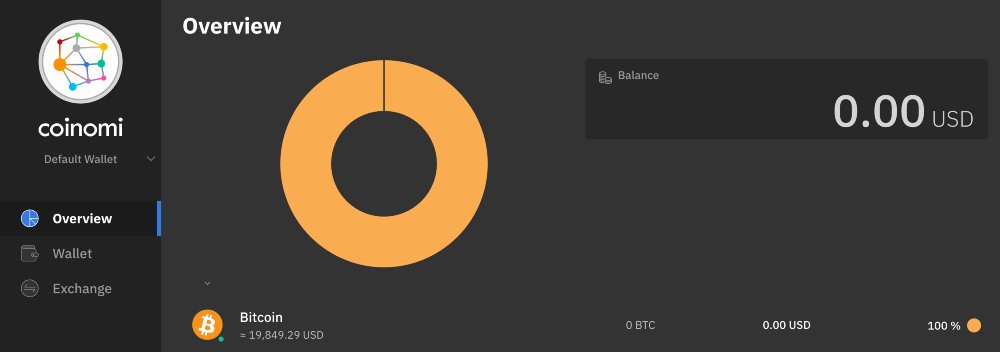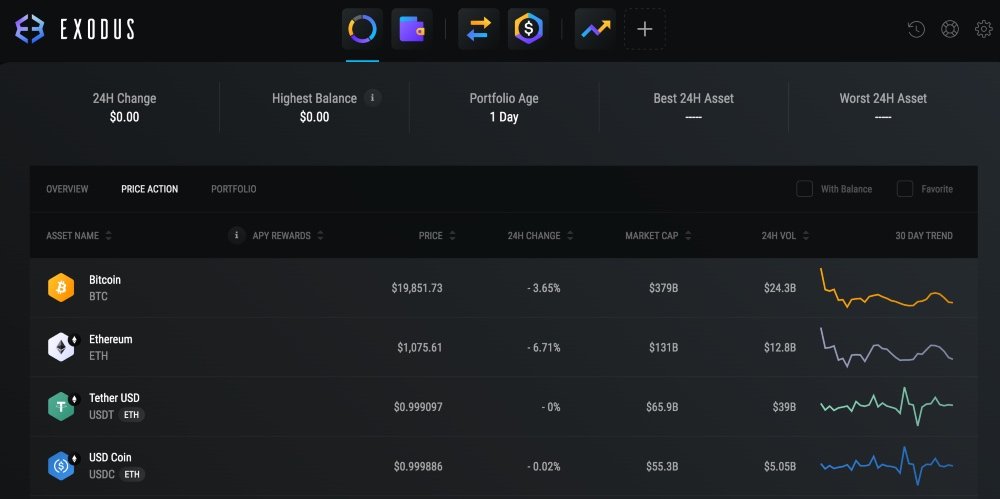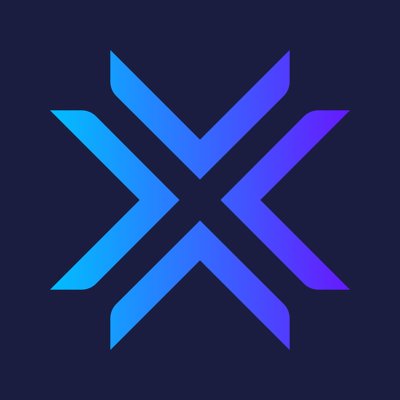Confronta Coinomi vs Exodus Wallet
Coinomi and Exodus have been present on the top wallets lists for years. These brands are well-known and recommended for beginners; these wallets are multi-functional and easy to use. This article reviews the main features and characteristics of these wallets. The main differences and similarities are shown in the table. Read through to see if these wallets meet your needs and which of them is better for you.
What Is Coinomi?
Coinomi is the oldest multi-chain wallet among industry leaders. It was created in 2014. The company headquarters is in the British Virgin Islands. The CEO is American entrepreneur George Kimionis. The wallet quickly gained popularity. As of 2022, it supports over 1,700 cryptocurrencies based on 125 blockchains. You will have a hard time finding a non-custodian wallet supporting more altcoins. On top of digital assets, Coinomi is capable of operating transactions with 168 fiat currencies. Also, Coinomi supports Seg-Wit.

Thanks to the integration with ShapeShift and Changelly, Coinomi users can effortlessly exchange altcoins within the wallet interface. Another partner providing the service to Coinomi users is Binance DEX. All these partnerships make Coinomi a handy tool not only for storage but also for exchanging money depending on what coin you need at the particular moment. One of the top priorities of Coinomi is the security of assets. The staking platform and dApp browser are also in place. Another vital feature of Coinomi is that it doesn't take commissions on top of miner fees.
What Is Exodus?
Exodus is a multi-currency non-custodial crypto wallet targeted at the newbies audience. The wallet is user-friendly and has an attractive and fun design. It was aimed to make people more confident in their first contact with cryptocurrencies. Exodus was founded in 2015 by JP Richardson and Daniel Castagnoli.

The wallet supports over 200 cryptocurrencies. It can be integrated with hardware wallets (Trezor) for better security. Exodus allows buying digital money with USD, EUR, and GBP. The wallet supports numerous payment methods, including ApplePay, bank card, and wire transfers. The wallet can be used for a token swap via the integrated ShapeShift service. Another important partnership is Changelly, which allows users to exchange cryptocurrencies easily.
As for commissions, Exodus doesn't charge anything on top of miners' fees. However, Exodus sets high miner fees to prioritize transactions of its users. The wallet is backed up with a 12-word seed phrase. Also, Exodus is characterized by a focus on anonymity as Exodus doesn't require personal data when you set the wallet. Considering that the wallet is non-custodial, the main threat comes from phishing attacks and weak passwords.
Coinomi vs. Exodus (table)
| Factor | Coinomi | Exodus |
| Platforms | iOS, Android, MacOS, Linux, Windows | iOS, Android, MacOS, Linux, Windows, browser |
|
Types of transactions |
send, recieve, store, exchange, swap, stake | send, recieve, store, exchange, swap |
| Transaction fees | miner fees | miner fees |
| Supported currencies | 1,770+ | 215+ |
| Security features | seed phrase, your data doesn't leave your device | seed phrase, your data doesn't leave your device |
| Payment methods | Simplex, bank card, wire transfer, etc | Apple Pay, bank card, wire transfer |
| Custodial? | no | no |
| Extra features | Cold staking, swaps via ShapeShift, exchange via Changelly, DeFi ready wallet | FTX exchange, swaps via ShapeShift, exchange via Changelly |
| Access | global | global |
Coinomi vs. Exodus (details)
Platforms
Both wallets have desktop and mobile versions (iOS- and Android-based). Exodus added mobile versions not long ago but what really matters is that now both wallets can be used on any device. What's more important is that Exodus can be installed as a browser extension.
Types of transactions
Both wallets are packed with features. Therefore they allow many types of transactions. However, staking available for Coinomi users is not supported by Exodus.
Transaction fees
Both wallets charge only miner fees. The only difference is that Exodus doesn't allow you to regulate the size of commissions, and you won't be able to minimize transaction fees if you use this wallet.
Supported currencies
You won't find a more versatile wallet regarding the number of supported currencies than Coinomi, among the top wallet brands. Coinomi supports eight times as many coins as Exodus. Because Coinomi also supports 168 fiat currencies, it makes the wallet much more convenient than Exodus.
Security features
Both Exodus and Coinomi are non-custodial HD wallets with solid security features. Exodus has an advantage of the Trezor wallet integrity. Hardware wallets are considered the safest, and Exodus users can secure their funds by buying and connecting a Trezor wallet. Coinomi users can't connect their accounts to hardware wallets.
Payment methods
Thanks to the partnership with Simplex, Coinomi has a large number of supported payment methods. Exodus supports fewer options.
Extra features
Coinomi supports staking, which is not the case for Exodus users. On the other hand, Exodus has an integrated FTX exchange, a feature not available for Coinomi users. All in all, both wallets are full-packed with features.
Access
Both wallets are available worldwide and don't require much user data.
| Società | ||
|---|---|---|
| User rating | 35 recensioni degli utenti | 23 recensioni degli utenti |
| Cryptogeek rating | ||
| Punteggio di Fiducia Come funziona |
About
|
Coinomi è uno dei più antichi portafogli di criptovaluta, che supporta una vasta gamma di valute e token dal lancio del progetto. Attualmente, il numero di monete e gettoni supportati supera i cinquecento. Il portafoglio fornisce uno scambio integrato come funzionalità aggiuntiva. Sono disponibili entrambe le versioni desktop e mobile del portafoglio.
|
Exodus è un portafoglio multi-criptovaluta di alto livello con ricche opportunità di personalizzazione e numerose funzionalità disponibili. È stato fondato nel 2016 con l'idea di fornire ai principianti cripto uno strumento conveniente per gestire le loro monete. Non ci sono costi di iscrizione o di manutenzione addebitati per il suo utilizzo.
|
Data di lancio
| 2014 | 2016 |
Località:
| International | USA |
Lingue
| English, German, French, Spanish, Russian, Chinese | English |
Tipo di portafoglio
| Software wallet | Software wallet |
Tipo di storage
| Cold wallet | Hot wallet |
Chiavi private
| Disponibile | Disponibile |
Monete disponibili
| 67 - Bitcoin (BTC), IOTA (MIOTA), Tezos (XTZ), Ethereum Classic (ETC), Verge (XVG), Bitcoin Gold (BTG), Zcash (ZEC), Dogecoin (DOGE), Decred (DCR), 0x (ZRX), Loopring (LRC), Komodo (KMD), Aion (AION), DigiByte (DGB), aelf (ELF), PIVX (PIVX), MonaCoin (MONA), Syscoin (SYS), ReddCoin (RDD), Power Ledger (POWR), Zcoin (XZC), Dentacoin (DCN), Horizen (ZEN), Iconomi (ICN), SmartCash (SMART), POA Network (POA), Nexus (NXS), Achain (ACT), GameCredits (GAME), Dent (DENT), Vertcoin (VTC), Time New Bank (TNB), Enjin Coin (ENJ), NavCoin (NAV), Ripio Credit Network (RCN), Einsteinium (EMC2), Groestlcoin (GRS), Peercoin (PPC), USD Coin (USDC), Ripple (XRP), Binance Coin (BNB), Bitcoin Cash (BCH), Bitcoin SV (BSV), Cardano (ADA), Dash (DASH), Ethereum (ETH), Litecoin (LTC), Monero (XMR), NEM (XEM), Tether (USDT), Tron (TRX), BitTorrent (BTT), NXM (NXM), Ampleforth (AMPL), xDai (STAKE), Nectar (NEC), sUSD (SUSD), Huobi Token (HT), Binance USD (BUSD), Celsius (CEL), Algorand (ALGO), OKB (OKB), TrueUSD (TUSD), HUSD (HUSD), Paxos Standard (PAX), Quant (QNT), DxChain Token (DX) | 90 - Bitcoin (BTC), Basic Attention Token (BAT), IOTA (MIOTA), Tezos (XTZ), Ethereum Classic (ETC), NEO (NEO), VeChain (VET), OmiseGO (OMG), Qtum (QTUM), Lisk (LSK), ICON (ICX), Ontology (ONT), Bitcoin Gold (BTG), Zcash (ZEC), Nano (NANO), Populous (PPT), Dogecoin (DOGE), DigixDAO (DGD), Waves (WAVES), Zilliqa (ZIL), Decred (DCR), Status (SNT), 0x (ZRX), Golem (GNT), DigiByte (DGB), Ark (ARK), Dragonchain (DRGN), QASH (QASH), Veritaseum (VERI), Gas (GAS), Voyager Token (VGX), FunFair (FUN), Revain (REV), SALT (SALT), Power Ledger (POWR), Zcoin (XZC), Storm (STORM), Storj (STORJ), TenX (PAY), Neblio (NEBL), Cindicator (CND), Dentacoin (DCN), Civic (CVC), Dent (DENT), Quantstamp (QSP), Gnosis (GNO), iExec RLC (RLC), Decentraland (MANA), Polymath (POLY), Po.et (POE), Loom Network (LOOM), Time New Bank (TNB), Aragon (ANT), Raiden Network Token (RDN), Metal (MTL), Santiment Network Token (SAN), Genesis Vision (GVT), Pillar (PLR), AirSwap (AST), Ripio Credit Network (RCN), Streamr DATAcoin (DATA), SingularDTV (SNGLS), Ambrosus (AMB), Edgeless (EDG), MediShares (MDS), AppCoins (APPC), USD Coin (USDC), Ripple (XRP), Binance Coin (BNB), Bitcoin Cash (BCH), Bitcoin SV (BSV), Cardano (ADA), Cosmos (ATOM), Dash (DASH), EOS (EOS), Ethereum (ETH), Litecoin (LTC), Monero (XMR), NEM (XEM), Stellar (XLM), Tether (USDT), Tron (TRX), Polkadot (DOT), BitTorrent (BTT), Compound Dai (CDAI), Crypto.com Coin (CRO), Algorand (ALGO), TrueUSD (TUSD), Hedera Hashgraph (HBAR), Solana (SOL) |
Sicurezza
| Personal | Personal |
Anonimità
| Medium | High |
Facilità di uso
| Easy | Easy |
Puoi connettere la carta
| no | no |
Ha la possibilità di trading
| Nessun dato | yes |
Ha i voucher e offerte
| Nessun dato | Nessun dato |
Caratteristiche
| Hierarchical Deterministic, Multi-Signature, Open Source, Biometric Authentication | Hierarchical Deterministic |
| About |
Coinomi è uno dei più antichi portafogli di criptovaluta, che supporta una vasta gamma di valute e token dal lancio del progetto. Attualmente, il numero di monete e gettoni supportati supera i cinquecento. Il portafoglio fornisce uno scambio integrato come funzionalità aggiuntiva. Sono disponibili entrambe le versioni desktop e mobile del portafoglio.
|
Exodus è un portafoglio multi-criptovaluta di alto livello con ricche opportunità di personalizzazione e numerose funzionalità disponibili. È stato fondato nel 2016 con l'idea di fornire ai principianti cripto uno strumento conveniente per gestire le loro monete. Non ci sono costi di iscrizione o di manutenzione addebitati per il suo utilizzo.
|
|---|---|---|
| Data di lancio | Data di lancio 2014 | Data di lancio 2016 |
| Località: | Località: International | Località: USA |
| Lingue | Lingue English, German, French, Spanish, Russian, Chinese | Lingue English |
| Tipo di portafoglio | Tipo di portafoglio Software wallet | Tipo di portafoglio Software wallet |
| Tipo di storage | Tipo di storage Cold wallet | Tipo di storage Hot wallet |
| Chiavi private | Chiavi private Disponibile | Chiavi private Disponibile |
| Monete disponibili | Monete disponibili 67 - Bitcoin (BTC), IOTA (MIOTA), Tezos (XTZ), Ethereum Classic (ETC), Verge (XVG), Bitcoin Gold (BTG), Zcash (ZEC), Dogecoin (DOGE), Decred (DCR), 0x (ZRX), Loopring (LRC), Komodo (KMD), Aion (AION), DigiByte (DGB), aelf (ELF), PIVX (PIVX), MonaCoin (MONA), Syscoin (SYS), ReddCoin (RDD), Power Ledger (POWR), Zcoin (XZC), Dentacoin (DCN), Horizen (ZEN), Iconomi (ICN), SmartCash (SMART), POA Network (POA), Nexus (NXS), Achain (ACT), GameCredits (GAME), Dent (DENT), Vertcoin (VTC), Time New Bank (TNB), Enjin Coin (ENJ), NavCoin (NAV), Ripio Credit Network (RCN), Einsteinium (EMC2), Groestlcoin (GRS), Peercoin (PPC), USD Coin (USDC), Ripple (XRP), Binance Coin (BNB), Bitcoin Cash (BCH), Bitcoin SV (BSV), Cardano (ADA), Dash (DASH), Ethereum (ETH), Litecoin (LTC), Monero (XMR), NEM (XEM), Tether (USDT), Tron (TRX), BitTorrent (BTT), NXM (NXM), Ampleforth (AMPL), xDai (STAKE), Nectar (NEC), sUSD (SUSD), Huobi Token (HT), Binance USD (BUSD), Celsius (CEL), Algorand (ALGO), OKB (OKB), TrueUSD (TUSD), HUSD (HUSD), Paxos Standard (PAX), Quant (QNT), DxChain Token (DX) | Monete disponibili 90 - Bitcoin (BTC), Basic Attention Token (BAT), IOTA (MIOTA), Tezos (XTZ), Ethereum Classic (ETC), NEO (NEO), VeChain (VET), OmiseGO (OMG), Qtum (QTUM), Lisk (LSK), ICON (ICX), Ontology (ONT), Bitcoin Gold (BTG), Zcash (ZEC), Nano (NANO), Populous (PPT), Dogecoin (DOGE), DigixDAO (DGD), Waves (WAVES), Zilliqa (ZIL), Decred (DCR), Status (SNT), 0x (ZRX), Golem (GNT), DigiByte (DGB), Ark (ARK), Dragonchain (DRGN), QASH (QASH), Veritaseum (VERI), Gas (GAS), Voyager Token (VGX), FunFair (FUN), Revain (REV), SALT (SALT), Power Ledger (POWR), Zcoin (XZC), Storm (STORM), Storj (STORJ), TenX (PAY), Neblio (NEBL), Cindicator (CND), Dentacoin (DCN), Civic (CVC), Dent (DENT), Quantstamp (QSP), Gnosis (GNO), iExec RLC (RLC), Decentraland (MANA), Polymath (POLY), Po.et (POE), Loom Network (LOOM), Time New Bank (TNB), Aragon (ANT), Raiden Network Token (RDN), Metal (MTL), Santiment Network Token (SAN), Genesis Vision (GVT), Pillar (PLR), AirSwap (AST), Ripio Credit Network (RCN), Streamr DATAcoin (DATA), SingularDTV (SNGLS), Ambrosus (AMB), Edgeless (EDG), MediShares (MDS), AppCoins (APPC), USD Coin (USDC), Ripple (XRP), Binance Coin (BNB), Bitcoin Cash (BCH), Bitcoin SV (BSV), Cardano (ADA), Cosmos (ATOM), Dash (DASH), EOS (EOS), Ethereum (ETH), Litecoin (LTC), Monero (XMR), NEM (XEM), Stellar (XLM), Tether (USDT), Tron (TRX), Polkadot (DOT), BitTorrent (BTT), Compound Dai (CDAI), Crypto.com Coin (CRO), Algorand (ALGO), TrueUSD (TUSD), Hedera Hashgraph (HBAR), Solana (SOL) |
| Sicurezza | Sicurezza Personal | Sicurezza Personal |
| Anonimità | Anonimità Medium | Anonimità High |
| Facilità di uso | Facilità di uso Easy | Facilità di uso Easy |
| Puoi connettere la carta | Puoi connettere la carta no | Puoi connettere la carta no |
| Ha la possibilità di trading | Ha la possibilità di trading Nessun dato | Ha la possibilità di trading yes |
| Ha i voucher e offerte | Ha i voucher e offerte Nessun dato | Ha i voucher e offerte Nessun dato |
| Caratteristiche | Caratteristiche Hierarchical Deterministic, Multi-Signature, Open Source, Biometric Authentication | Caratteristiche Hierarchical Deterministic |
Media
Sito web
| www.coinomi.com | www.exodus.io |
| Coinomiwallet | Exodus_io |
| Sito web | Sito web www.coinomi.com | Sito web www.exodus.io |
|---|---|---|
| Twitter Coinomiwallet | Twitter Exodus_io |
Vantaggi
| - Chiavi private memorizzate sui dispositivi mobili degli utenti - Integrazione con gli scambi ShapeShift e Changelly per il trading crittografico - Non addebita alcuna commissione - Supporto 24/7 | - Accesso alle chiavi private - La possibilità di recuperare le chiavi private, utilizzando la frase seme - Grande varietà di valute - Facile scambio (conversione da cripto a cripto) - Supporto rapido e ampia guida "Aiuto" |
Svantaggi
| - Il supporto tecnico non risolve rapidamente i problemi - Nessuna versione aggiornata di open source. | - Mancanza di importanti funzioni di sicurezza - Commissioni relativamente alte |
Valutazione
| User rating | User rating 35 recensioni degli utenti | User rating 23 recensioni degli utenti |
|---|---|---|
| Cryptogeek rating | Cryptogeek rating | Cryptogeek rating |
| Vantaggi | Vantaggi - Chiavi private memorizzate sui dispositivi mobili degli utenti - Integrazione con gli scambi ShapeShift e Changelly per il trading crittografico - Non addebita alcuna commissione - Supporto 24/7 | Vantaggi - Accesso alle chiavi private - La possibilità di recuperare le chiavi private, utilizzando la frase seme - Grande varietà di valute - Facile scambio (conversione da cripto a cripto) - Supporto rapido e ampia guida "Aiuto" |
| Svantaggi | Svantaggi - Il supporto tecnico non risolve rapidamente i problemi - Nessuna versione aggiornata di open source. | Svantaggi - Mancanza di importanti funzioni di sicurezza - Commissioni relativamente alte |
La valutazione degli utenti di Coinomi è 3.7, basata sulle recensioni degli utenti di 35. La valutazione degli utenti dell'azienda Exodus è 4, basata sulle recensioni degli utenti di 23.
We also calculate the special Cryptogeek TrustScore based on the characteristics of each wallet.
| Scegliamo il vincitore in base al nostro Punteggio di Fiducia. Ricorda, dipende ancora da te quale compagnia scegliere! Come calcoliamo Il Punteggio di Fiducia? |
It's safe to say that by most parameters, Coinomi beats Exodus. The latter may be considered more attractive and convenient in design, but we can't know that this difference is crucial. If you want a multi-currency wallet supporting FTX exchange, then Exodus, not Coinomi, will be the choice. Exodus will be the choice if you wish to use a software wallet to integrate it with a Trezor wallet. In all other cases, Coinomi seems to be a better option than Exodus.
Coinomi and Exodus have been present on the top wallets lists for years. These brands are well-known and recommended for beginners; these wallets are multi-functional and easy to use. This article reviews the main features and characteristics of these wallets. The main differences and similarities are shown in the table. Read through to see if these wallets meet your needs and which of them is better for you.
What Is Coinomi?
Coinomi is the oldest multi-chain wallet among industry leaders. It was created in 2014. The company headquarters is in the British Virgin Islands. The CEO is American entrepreneur George Kimionis. The wallet quickly gained popularity. As of 2022, it supports over 1,700 cryptocurrencies based on 125 blockchains. You will have a hard time finding a non-custodian wallet supporting more altcoins. On top of digital assets, Coinomi is capable of operating transactions with 168 fiat currencies. Also, Coinomi supports Seg-Wit.

Thanks to the integration with ShapeShift and Changelly, Coinomi users can effortlessly exchange altcoins within the wallet interface. Another partner providing the service to Coinomi users is Binance DEX. All these partnerships make Coinomi a handy tool not only for storage but also for exchanging money depending on what coin you need at the particular moment. One of the top priorities of Coinomi is the security of assets. The staking platform and dApp browser are also in place. Another vital feature of Coinomi is that it doesn't take commissions on top of miner fees.
What Is Exodus?
Exodus is a multi-currency non-custodial crypto wallet targeted at the newbies audience. The wallet is user-friendly and has an attractive and fun design. It was aimed to make people more confident in their first contact with cryptocurrencies. Exodus was founded in 2015 by JP Richardson and Daniel Castagnoli.

The wallet supports over 200 cryptocurrencies. It can be integrated with hardware wallets (Trezor) for better security. Exodus allows buying digital money with USD, EUR, and GBP. The wallet supports numerous payment methods, including ApplePay, bank card, and wire transfers. The wallet can be used for a token swap via the integrated ShapeShift service. Another important partnership is Changelly, which allows users to exchange cryptocurrencies easily.
As for commissions, Exodus doesn't charge anything on top of miners' fees. However, Exodus sets high miner fees to prioritize transactions of its users. The wallet is backed up with a 12-word seed phrase. Also, Exodus is characterized by a focus on anonymity as Exodus doesn't require personal data when you set the wallet. Considering that the wallet is non-custodial, the main threat comes from phishing attacks and weak passwords.
Coinomi vs. Exodus (table)
| Factor | Coinomi | Exodus |
| Platforms | iOS, Android, MacOS, Linux, Windows | iOS, Android, MacOS, Linux, Windows, browser |
|
Types of transactions |
send, recieve, store, exchange, swap, stake | send, recieve, store, exchange, swap |
| Transaction fees | miner fees | miner fees |
| Supported currencies | 1,770+ | 215+ |
| Security features | seed phrase, your data doesn't leave your device | seed phrase, your data doesn't leave your device |
| Payment methods | Simplex, bank card, wire transfer, etc | Apple Pay, bank card, wire transfer |
| Custodial? | no | no |
| Extra features | Cold staking, swaps via ShapeShift, exchange via Changelly, DeFi ready wallet | FTX exchange, swaps via ShapeShift, exchange via Changelly |
| Access | global | global |
Coinomi vs. Exodus (details)
Platforms
Both wallets have desktop and mobile versions (iOS- and Android-based). Exodus added mobile versions not long ago but what really matters is that now both wallets can be used on any device. What's more important is that Exodus can be installed as a browser extension.
Types of transactions
Both wallets are packed with features. Therefore they allow many types of transactions. However, staking available for Coinomi users is not supported by Exodus.
Transaction fees
Both wallets charge only miner fees. The only difference is that Exodus doesn't allow you to regulate the size of commissions, and you won't be able to minimize transaction fees if you use this wallet.
Supported currencies
You won't find a more versatile wallet regarding the number of supported currencies than Coinomi, among the top wallet brands. Coinomi supports eight times as many coins as Exodus. Because Coinomi also supports 168 fiat currencies, it makes the wallet much more convenient than Exodus.
Security features
Both Exodus and Coinomi are non-custodial HD wallets with solid security features. Exodus has an advantage of the Trezor wallet integrity. Hardware wallets are considered the safest, and Exodus users can secure their funds by buying and connecting a Trezor wallet. Coinomi users can't connect their accounts to hardware wallets.
Payment methods
Thanks to the partnership with Simplex, Coinomi has a large number of supported payment methods. Exodus supports fewer options.
Extra features
Coinomi supports staking, which is not the case for Exodus users. On the other hand, Exodus has an integrated FTX exchange, a feature not available for Coinomi users. All in all, both wallets are full-packed with features.
Access
Both wallets are available worldwide and don't require much user data.

